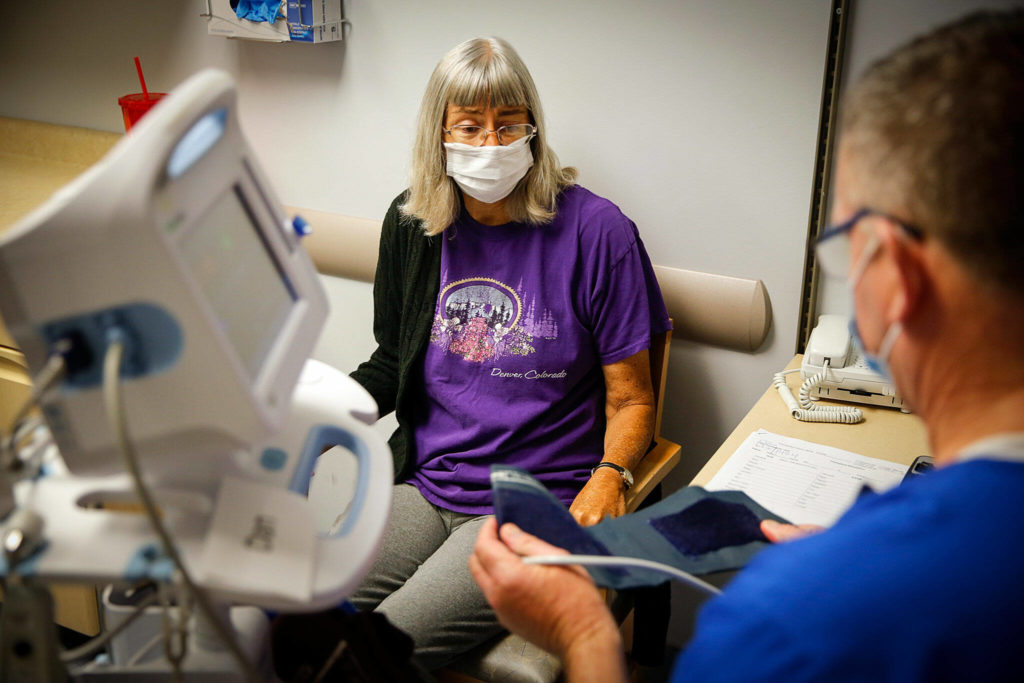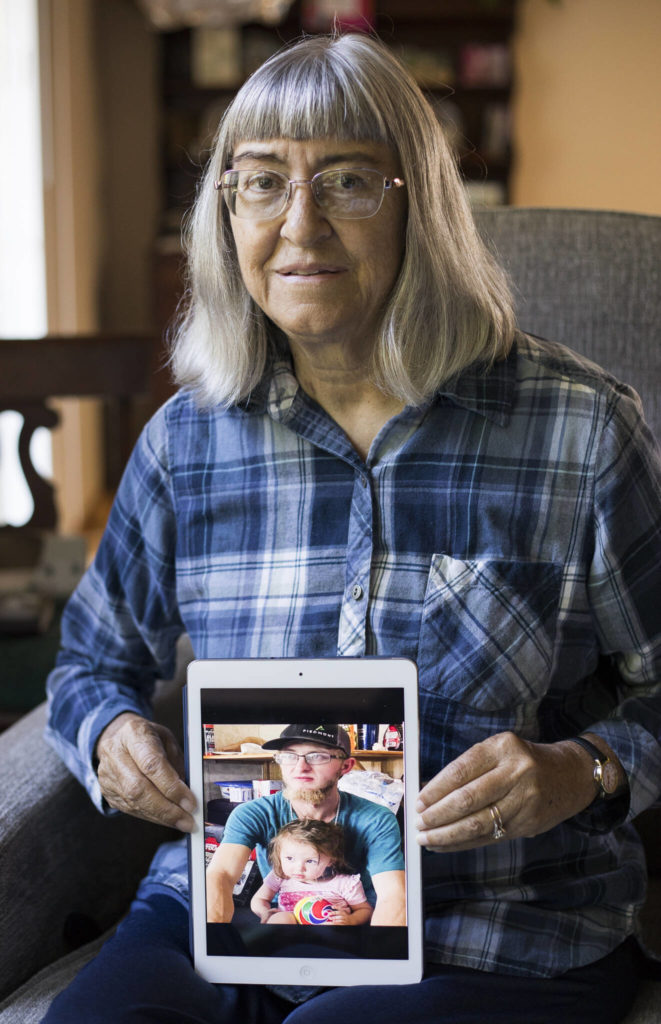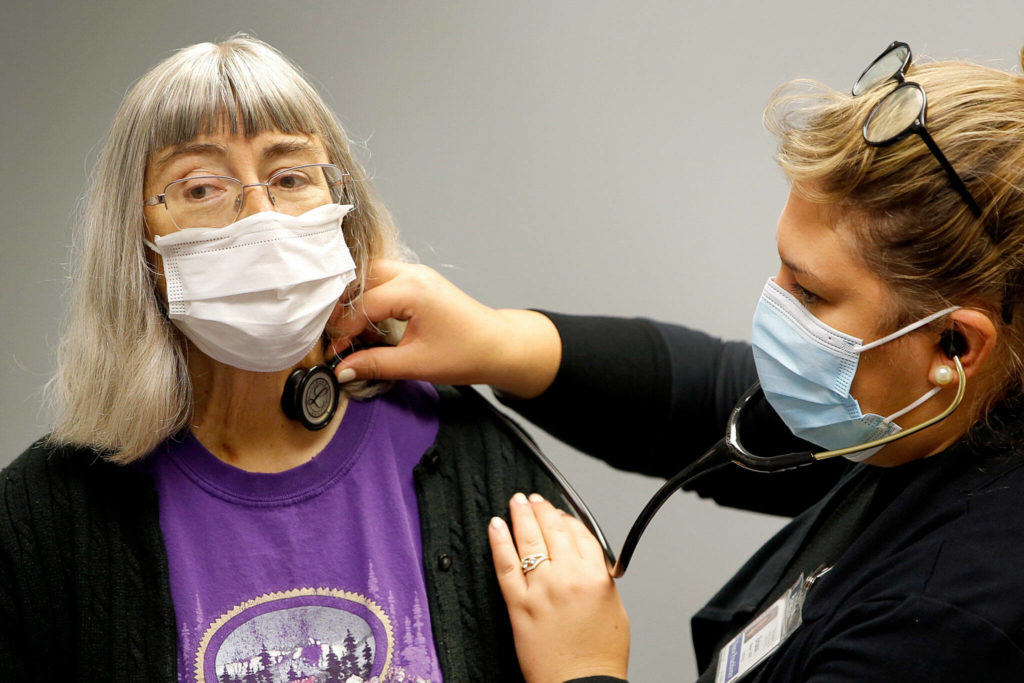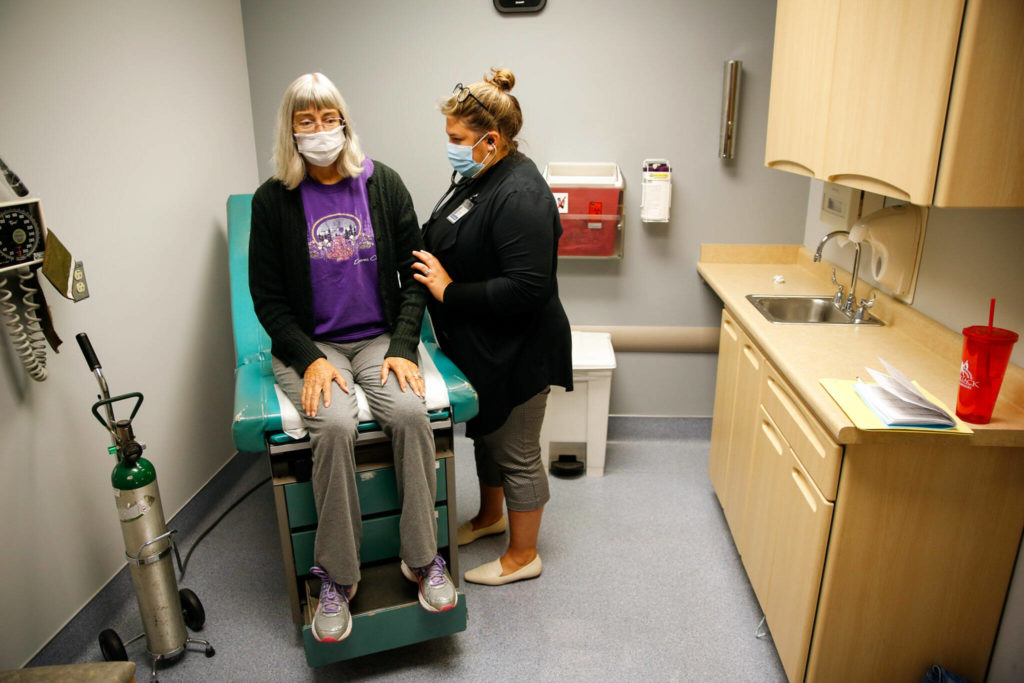STANWOOD — Deena Jones, a retired Arlington pastor, was supposed to receive her brother’s kidney on Oct. 13.
But in a strange twist of fate, the Stanwood resident received a different kidney: from her deceased nephew. Her brother’s son, 27, had been killed by a random stranger at a 7-Eleven on Labor Day, according to police.
The surgical team at UW Medicine told Jones they’d never seen or heard of a living kidney donor’s son becoming a deceased donor.
“It’s a fascinating case,” said Dr. Nicolae Leca, Jones’ kidney doctor. “I know Deena is very, very marked by this. She’s had a very successful outcome from this, but she is still emotionally conflicted by the whole process.”
In addition to his aunt, five others on transplant wait lists around the country also received organs from the tragedy.
“The fact that it worked out the way it did, with a kidney going to me, has helped my brother and sister-in-law with their grief,” Jones said.
Jones led Arlington United Church for 20 years. In her time there, Jones encouraged the community to support those in need by starting a cold weather shelter and offering free lunches. She also focused on multicultural events and marches against racism.
At the time she was approved for surgery, Jones had been on dialysis for two years. Three times a week — Tuesday, Thursday and Saturday — she’d get hooked up to a machine to filter her blood at Skagit Valley Kidney Center in Mount Vernon. Each treatment lasts about four hours.
On Sept. 7, 2019, Jones noticed her urine was brown.
But a creatinine test five days later showed her kidneys were functioning normally. Healthy kidneys filter the chemical compound out of the blood.
Then she noticed other signs of kidney failure, which can include swollen ankles or feet, shortness of breath, fatigue, confusion, nausea, weakness and irregular heartbeat.
Two weeks later, Jones was in the emergency room at Cascade Valley Hospital in Arlington.
‘The lucky winner’
Acute kidney failure — also called acute renal failure or acute kidney injury — occurs when your kidneys suddenly can’t filter waste from your blood. When kidneys fail this fast, dangerous levels of waste build up and your blood’s chemical makeup gets out of balance.
Jones, 62, was diagnosed on Sept. 28, 2019, with Goodpasture syndrome, a rare but serious autoimmune disease. Her kidneys failed because her immune system mistakenly attacked them.
Though acute renal failure is common — there are more than 200,000 cases reported each year in the U.S. — Goodpasture syndrome is diagnosed in fewer than two cases per 1 million Americans, or about 650 cases per year.
After her diagnosis, Jones was transferred to Skagit Valley Hospital in Mount Vernon and then UW Medicine in Seattle. She stayed in the hospital for two weeks.
With Goodpasture syndrome, Jones required either a kidney transplant or lifelong dialysis, a treatment that filters the blood by machine.
“Dialysis is a good thing,” she said. “It saves our lives, but it’s not perfect. It doesn’t work as well as a kidney.”
Jones said a chart at Skagit Valley Kidney Center showed her that at her age, life expectancy would have been about 10 years on dialysis. Now, with this kidney, she said 20 years is possible.
“Hopefully, she’ll live longer than that,” said Leca, who is the medical director for kidney transplants at UW Medicine.
On June 28, 2020, Jones retired as the pastor of the Arlington United Church. Dialysis treatments and working at the church during the pandemic, she said, proved to be too stressful.
Because of her autoimmune disease, doctors told Jones she wouldn’t be eligible until her antibodies stayed at a normal level for six months.
Three of her five siblings under the age of 70 — Teri Burnham, Cherry Marsden and Jim Burnham — were screened as potential donors. Her 61-year-old brother, of Hartsville, South Carolina, passed all the tests and was approved.
Her brother had no hesitations. His sister needed a working kidney; he had an extra.
“I was the lucky winner, so to speak,” Jim Burnham said.
Jones was scheduled to receive her brother Jim’s kidney on July 7. She was so excited, she was dancing.
But a blood test on July 2 at the Skagit Valley Kidney Center showed severe anemia. Jones needed to go to the emergency room for a blood transfusion, as her red cell blood count was dangerously low.
Leca confirmed what they already knew: The surgery had to be rescheduled.
“We were totally shocked,” Jim Burnham said. “We thought it had to be a mistake.”
Flight of the kidney
A few weeks later, Jones’ brother called her to tell her he’d scheduled the kidney transplant for Oct. 13.
He didn’t mention his son had been stabbed the day before, on Sept. 6.
His son, William “Billy” Burnham, had been visiting family in South Carolina for Labor Day weekend. On Monday, on his drive home, Billy stopped at a 7-Eleven in Charlotte, North Carolina, to get a pack of cigarettes. On his way back to the car, a man stabbed him in the neck, according to family and local media.
He jumped into the driver’s seat and drove for help. His fiancee, Ashlie Brown, grabbed a T-shirt from the back seat and tried to stop the bleeding. He passed out as Brown ran to get help. Urgent care clinic nurses gave Billy CPR and called for an ambulance.
He was transferred to Atrium Health Carolinas Medical Center, where he was immediately wheeled into surgery. Doctors determined the 29-year-old assailant had severed Billy’s carotid artery and damaged the aorta, the main artery to the heart.
“They told us how much a body could hold, and they put in about three or four times that into Billy during the surgery, because he was losing it faster than they could pump it in, pretty much,” Jim Burnham said.
His son was unconscious and had suffered several strokes, but Jim Burnham said it seemed like he’d recover. If Billy were to wake up, he’d be paralyzed on the left. The ride side of his brain had lost blood for too long.
But Billy didn’t wake up. On Sept. 9, he was pronounced dead.
Billy’s father asked doctors if his 27-year-old’s kidney could be flown to Seattle for a transplant. Of course, they said. It’s known as a directed donation.
On Sept. 12, Jones was prepped for surgery at UW Medicine.
“The kidney was out-of-body for more than 24 hours, so the surgeon did tell me there would be a higher risk that the kidney might take longer to wake up, so they say, and start functioning again, but it seemed to start working right away,” she said.
The police assumed Billy and Ashlie knew their attacker “because no way would someone come up for absolutely no reason at all and stab someone,” Jim Burnham said.
But the Charlotte-Mecklenburg Police Department soon determined the attack was random.
Since Billy’s death, Charlotte-Mecklenburg detectives have charged Bryan Abrahan Feliz-Ramirez in the homicide.
But according to the police, Billy Burnham wasn’t his only victim. He was the third. Feliz-Ramirez had also stabbed two others — one on Sept. 5 and another on Sept. 6.
Feliz-Ramirez was arrested Sept. 7. At that time, he was charged with attempted first-degree murder, assault with a deadly weapon inflicting serious injury, and two counts of assault with a deadly weapon intent to kill.
Doctors harvested six organs for transplant. Billy donated both kidneys, one of which was saved for his aunt, as well as his pancreas, liver, heart and spine.
‘It will get better’
Siblings have a 25% chance of being a perfect match, Leca said. A niece or nephew almost never match perfectly — but with 21st century advances in immunosuppressant medication, it’s no longer necessary for a successful transplant.
Even more importantly than matching, Leca said kidney doctors look for compatibility with special tests called crossmatches. Jones’ kidney was compatible with her donor.
“In modern transplantation, the level of matching has become less important as differences in rejection risk are very small and overcome by developments in more effective immunosuppressive medications,” he said, as long as a transplant is compatible, like in Deena’s case.
However, Leca noted, a perfect match can still make a difference.
Four days after the surgery, Jones was allowed to go home.
Billy’s kidney is working, but there is some lag time before it functions at 100%.
“The kidney sort of forgets how to regulate the amount of fluid in one’s body,” Jones said. “So everything I drink just runs straight out. But it will get better.”
She doesn’t get such good sleep because she wakes up to urinate about every half-hour. Now it’s closer to every hour or hour-and-a-half.
She goes back twice a week, on Tuesdays and Thursdays, to UW Medicine for blood and urine tests to see how her new kidney is working. She has had some issues with blood pressure, but Jones is recovering well.
Had it not been a directed donation, Jones said she never would have received her nephew’s kidney. It would have gone to a younger recipient.
“My brother kept saying, ‘If this doesn’t work, we’ve still got our date in October,’” she said.
Jones didn’t want that.
“Mentally and emotionally, I don’t think he’d be in any shape to donate a kidney,” she said.
What her brother didn’t tell her until later was that, three years ago, they talked to their sons and daughters about their aunt’s need for a kidney transplant. All four volunteered their own kidneys — including Billy.
“Billy was the most determined,” Jim Burnham said. “He was immediately saying, ‘She can have one of mine.’”
Jim Burnham told all of them no.
“Her brothers and sisters will try first,” he said. “If none of us qualify, then we’ll be looking to you.”
The fact that Billy had already offered a kidney made the decision to donate easy.
“He was a very, very giving person,” his father said. “If you needed something and he could spare it, he’d be the first to give it.”
Now that she has a working kidney, Deena and Chris Jones hope to buy an RV so they can travel all over the country. They’ll, of course, stop in Hartsville, South Carolina, to see Jim and Deanna, plus Billy’s fiancee, their 4-year-old son Owen and 3-year-old daughter Sophie.
“This is a terrible blow to lose their son, and they’re grieving something terrible, but it brings a measure of comfort not only knowing, first of all, that his sister was able to be helped, but also that so many others have received the gift of life,” Deena Jones said. “I believe that’s helping.”
Jones has seen it in her time as a pastor, too, how organ donation is a benefit to the recipient, but also the family members of the deceased.
“They can see something good coming from a sad situation,” she said.
Jim Burnham said he and his wife are looking forward to calls and emails from the recipients of Billy’s other organs. They said it helps them through their grief.
“We’ve tracked Deena’s progress — she seems to be doing amazing,” Jim Burnham said. “We would love to hear from the others.”
Sara Bruestle: 425-339-3046; sbruestle@
Talk to us
> Give us your news tips.
> Send us a letter to the editor.
> More Herald contact information.





























